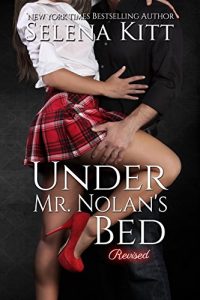I have a bit of a story to tell you about this story.
Once upon a time back in 2008, this book was published under the title “Under Mr. Nolan’s Bed” without that annoying “Revised” afterward. It was a taboo story about an eighteen-year-old girl falling in love with her father’s best friend and included father-daughter incest. That book sat happily on Amazon’s virtual shelves for two years.
But that is not the book currently for sale at Amazon. Instead, they sell the “revised” version. In “Under Mr. Nolan’s Bed (Revised)”, the father and daughter are not biologically related (they are step-relations), so there is no actual biological incest that ever takes place.
Why the change?
That’s a long story, and you can skip it if you like, but if you are an erotica reader who enjoys reading adult fantasies (and I emphasize that word fantasy) about taboo topics, this tale might be of some interest to you and may even affect your future reading choices.
On December 9, 2010, I was contacted by CreateSpace (Amazon’s Print on Demand service) who publishes my print books. They informed me that several of my titles had been removed for violating their “content guidelines.” When I consulted their guidelines I found them so vague as to be useless—were they saying my content was illegal? Public domain? Stolen? Offensive? (All of these were on the list). When I inquired as to the specifics of the violation, they were not forthcoming, and sent a form letter response stating that Amazon “may, in its sole discretion, at any time, refuse to list or distribute any content that it deems inappropriate.”
On Sunday, December 12, 2010 the print titles that had been removed had now disappeared from the Kindle store. I have over fifty titles selling on Amazon, all of them in erotic fiction categories. The only thing these three singled-out titles had in common, besides being written by me? They were all erotic incest fantasy fiction.
About this time, I heard that two other authors both had erotic incest-related titles removed from Amazon’s site. After some research, I discovered more authors whose books had also been removed. As the night wore on, and public outcry about censorship and banned books began on Twitter at #amazonfail and #amazoncensors and on their own Kindle Boards, more and more incest-related erotica titles began to disappear from the Amazon site, so that the “Kindle Incest” search page began to look like Swiss cheese.
I’m quite sure, although I can’t prove it, that all of this was a result of the controversy about the self-published book The Pedophile’s Guide to Love and Pleasure by Phillip R. Greaves (that link is no longer active on Amazon, by the way). It went on sale, according to Amazon’s book page, on October 28, 2010. On November 10, 2010, the link disappeared. Before Amazon pulled the book, they issued this statement:
“Amazon believes it is censorship not to sell certain books simply because we or others believe their message is objectionable. Amazon does not support or promote hatred or criminal acts, however, we do support the right of every individual to make their own purchasing decisions.”
And when the L.A. Times did an interview with Russ Grandinetti, the “head of content for Amazon.com’s Kindle business,” he reiterated Amazon’s mission statement: “Our vision is [to make] every book ever written, in any language, in print or out of print, all available within 60 seconds.”
So much for those noble ideas and goals. They removed Mr. Greaves’ book and then, a month later, started removing other erotic titles from their site. Three of mine were victims.
I want to be clear that while the subject of incest fantasy may not appeal to some, there is no underage contact in any of my work, and I make that either explicitly clear in all my stories or I state it up front in the book’s disclaimer. I don’t condone or support actual incest, just as someone who writes mysteries about serial killers wouldn’t condone killing. What I write is fiction. It’s fantasy, not reality. Certainly what I write is controversial, but it seems as undeserving of censorship as… well…
As fellow author, Will Belegon, noted, if Amazon is going to start pulling books with incest in them: “I just re-read Genesis 19: 30-38 and realized that Lot’s daughters got him drunk, had sex with him and bore sons. I demand you follow your clear precedent and remove The Bible from Kindle.”
Or perhaps Amazon should create a new television ad and ban the book the woman is reading in one of their TV advertisements on her Kindle (“Sleepwalking” by Amy Bloom) which tells the story of a nineteen-year-old boy who has a sexual encounter with his stepmother, which, in some states, is legally incest. Oh, but wait, Amazon says incest between step-relations is ok. There’s logic for you.
If Amazon had clear guidelines that were applied to all publishers across every platform and enforced them consistently, this would be a moot issue. By not clearly stating their position and choosing books either arbitrarily or based on searches of top-rated titles (which happen to be the most visible titles in the genre), they are deliberately hiding a clear case of discrimination and what amounts to censorship (albeit ipso facto and not by a government body but rather a retailer) because of their lack of transparency.
I have said before and I’ll say it again—I have no problem with a company deciding what they will and will not sell—but I do have a problem with the way Amazon has handled this. They could have come to the publishers and told them about their new guidelines, given them time to prepare their authors and make other arrangements. Anthologies that contained offending material, for example, could have been reworked and re-uploaded instead of being removed, without any penalty in loss in ranking.
Instead, they clandestinely removed titles, informed authors and publishers days or weeks later, and most importantly, refused to tell anyone what they were doing or why. They should, in my opinion, be clear about what is and isn’t acceptable. This “ban as we go” way of doing things is just going to move from one hot button topic to the next. If you’re a business, and you’re going to make a policy, then make one. Readers and authors have a right to know where Amazon stands. That’s just good business.
Because of Amazon’s actions, I have personally self-censored my books, releasing a new version of Under Mr. Nolan’s Bed without the father/daughter incest angle at all titled, Plaid Skirt Confessions, and a different version of Naughty Bits without the sibling incest titled, Foreign Exchange. I’ve clearly stated in the descriptions that they are reworked versions of the originals, so readers will know.
I’ve also now released a special Amazon edition of all of the banned books as well, allowing Amazon customers access to the stories with the taboo aspects included but without the offending biological incest. Amazon, apparently, has decided that as long as the incest takes place between consenting step-relations, it’s okay in their book. Until that changes (and who knows when and how that might happen—Amazon sure isn’t going to tell us!) you, Dear Reader, will have access on Amazon to my taboo collection, albeit in a somewhat altered form. There is also a “sanitized” version of this book (Forbidden Fruit) without any incest at all.
In speculating on the motivations of Amazon’s actions, as they have not been forthcoming with any statement or explanation, I am sure they responded out of reactionary fear. While I am not a lawyer, constitutional scholar or legal expert on free speech and intellectual freedom, I am an author and publisher and know that, regardless of the technical legalities of Amazon’s actions, buckling to this pressure and the removal of books is hurting their bottom line. It’s damaging relationships with readers, authors, and publishers as well as organizations such as the American Library Association and the ACLU, among others, who are interested in supporting free speech. I should also note that I am a professional psychologist and, while no longer licensed (by personal choice) or working in the field, it’s clear that when individuals and organizations fail to recognize the difference between fantasy and reality, problems such as this result.
If any of this concerns you as a reader of erotica, please continue to support intellectual freedom and free speech. Let Amazon and other retailers know your preferences. Inform the media when you discover incidents of this type of retail censorship.
The truth is, you are in a majority and you are very important to retailers. According to the numbers being thrown around, Amazon is alienating its ebook “power-buyer” audience by banning erotic fiction. Those protesting about erotic fiction on retail shelves are actually just a vocal minority. The reality is that you, the “power-buyers,” are the majority.
And if you don’t speak up, who will? Do you really want your choices being limited by a vocal minority? Please don’t be a part of the silent majority. Make a difference. Let yourself be heard. Be a vocal consumer. There’s nothing wrong with your choice of reading material. We all know the saying, “Guns don’t kill people—people kill people,” right? The same is true for fiction. Fantasy doesn’t hurt anyone. Only people can do that. Reading erotica isn’t wrong. It’s simply a preference—and a perfectly valid one.
Let freedom ring!
Thank you for your support.
XOXO
SELENA KITT


